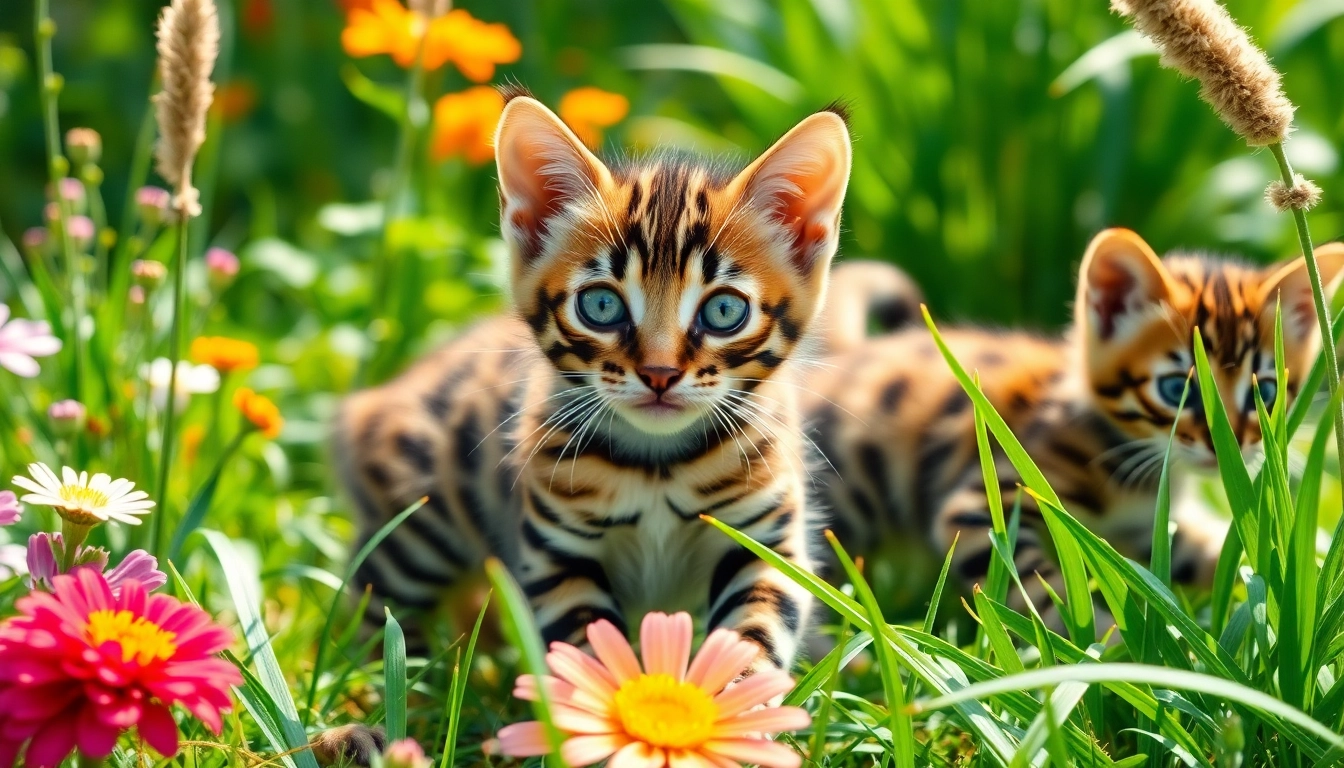Introduction to Bengal Cats in Orange County
Bengal cats, with their stunning coats and playful personalities, have captured the hearts of pet lovers across the globe. In Orange County, these exotic felines are gaining popularity, making Bengal breeders a vital resource for finding high-quality companions. For those interested in acquiring a Bengal kitten, understanding the local breeding landscape, including Bengal Breeders Orange County, is essential to ensure a responsible and rewarding adoption experience.
What Makes Bengal Cats Unique?
Bengal cats are distinguished by their wild appearance, resembling leopards, which stems from their ancestry. Breeders selectively crossed domestic cats with the Asian leopard cat, resulting in this striking breed that boasts distinctive markings and a highly energetic nature. Their coats are not just beautiful; they also have a soft, luxurious feel, often described as “soft as silk.”
Beyond their looks, Bengals are incredibly social and intelligent. They thrive on interaction, making them a perfect choice for families or individuals seeking a lively pet. Their playful demeanor often leads them to enjoy games of fetch and agility courses. Additionally, Bengal cats are known for their curiosity and need for mental stimulation, often engaging in activities that challenge their intellect.
Overview of Bengal Breeders in Orange County
Orange County is home to a number of reputable Bengal breeders, each striving to produce high-quality kittens with excellent temperaments. The breeders here are committed to following best practices in breeding, ensuring their cats are healthy, socialized, and well-adapted. Breeders often participate in local and national cat shows, showcasing their cats and obtaining recognition from organizations such as The International Cat Association (TICA).
By choosing a responsible breeder, prospective owners can expect transparency regarding the lineage and health of the kittens. This includes access to health records, information on socialization methods, and details about the breeding program. Additionally, many breeders offer support to new owners, helping them navigate the transition of bringing a Bengal kitten into their lives.
Importance of Selecting a TICA Registered Breeder
When searching for a Bengal kitten, selecting a TICA registered breeder is crucial. Such breeders are held to high standards of ethics and professionalism, which assures potential owners that their kittens are bred responsibly. TICA breeders adhere to guidelines which include health testing for genetic disorders, responsible breeding practices, and maintaining records of each cat’s history.
Choosing a TICA registered breeder not only provides peace of mind but also aids in promoting the breed’s integrity. These breeders prioritize the health and welfare of their cats, focusing on producing kittens that conform to the breed standard while also possessing friendly, social temperaments. Owners who obtain their kittens from TICA registered breeders are more likely to experience a healthy pet that thrives in a household environment.
Choosing the Right Breeder
Key Qualities of Reputable Bengal Breeders
Finding the right breeder is a pivotal step in welcoming a Bengal kitten into your home. Several key qualities define reputable breeders:
- Health Testing: A responsible breeder conducts health tests on their breeding pairs to avoid genetic conditions common in Bengals, such as Hypertrophic Cardiomyopathy (HCM).
- Socialization: Kittens raised in a loving environment with proper socialization are more likely to adapt well to new homes.
- Transparency: Good breeders are willing to share the health history of their cats and discuss their breeding philosophy.
- Support: A reputable breeder provides ongoing support to new owners, from dietary advice to training tips.
- Ethical Practices: Ethical breeders prioritize the well-being of their cats, ensuring a loving environment and proper care.
Questions to Ask Future Breeder
Engaging with a breeder should involve an open dialogue where potential owners feel comfortable asking questions. Here are some important queries to consider:
- What health testing do you perform on your breeding cats?
- Can I meet the kitten’s parents?
- What socialization methods do you use for your kittens?
- What is your return policy if the kitten does not adjust well to my home?
- Can you provide references from previous kitten owners?
Red Flags to Watch For
While searching for breeders, it’s also important to be aware of potential red flags indicating a less-than-reputable operation. Signs to watch for include:
- A lack of health clearances for breeding cats.
- Unwillingness to provide documentation or answer questions about breeding practices.
- Kittens being sold too young (before 12-16 weeks of age).
- Substandard living conditions for animals.
- Pressure to make a quick purchase without proper considerations.
Understanding Bengal Cat Care
Nurturing Your Bengal Kitten: Health & Environment
Once you’ve chosen a Bengal kitten, nurturing it properly is critical to its well-being. Creating a healthy environment involves several factors:
- Safe Space: Ensure your home has a comfortable and safe area for the kitten to explore. Remove any hazardous items and provide scratching posts and climbing structures.
- Regular Veterinary Care: Schedule regular check-ups and vaccinations to monitor health and prevent illnesses. Keep records of health visits and vaccinations.
- Environmental Enrichment: Provide stimulating toys and activities to satisfy their curious and playful nature. Bengals love interactive toys and puzzle feeders.
- Understanding Behavior: Bengals can be vocal and demanding. Familiarize yourself with their social behaviors and needs to foster a positive relationship.
Diet and Nutritional Needs of Bengals
Proper nutrition is vital for your Bengal’s health. Bengals are active cats that require a high-protein diet to maintain their energy levels. Here are some key considerations for feeding a Bengal:
- High-quality Protein Sources: Look for food that lists real meat as the first ingredient. Fish, chicken, and beef are excellent protein options.
- Avoid Fillers: Minimize processed foods containing grains, corn, or soy, as they offer little nutritional value to your Bengal.
- Hydration: Bengals are prone to urinary issues, so provide plenty of fresh water and consider incorporating wet food into their diet for added moisture.
- Consulting with a Vet: Work with a veterinarian to establish a specific dietary plan tailored to your Bengal’s age, weight, and health requirements.
Training Tips for New Bengal Owners
Training your Bengal kitten can be a rewarding experience due to their intelligence and eagerness to learn. Here are some strategies to train your Bengal effectively:
- Start Early: Begin training your kitten as early as possible to establish good habits.
- Use Positive Reinforcement: Reward good behavior with treats and praise. Bengals respond best to positive reinforcement strategies.
- Be Consistent: Use consistent commands and routines to help your Bengal understand expectations.
- Teach Basic Commands: Basic commands like “sit,” “stay,” and “come” are essential for good behavior. Use short training sessions to maintain focus.
Community and Resources for Bengal Owners
Local Bengal Cat Clubs and Organizations
Joining local Bengal cat clubs can provide invaluable resources and a sense of community among other Bengal enthusiasts. Organizations often host events, breed showcases, and educational seminars, helping owners learn more about the breed and connect with experts. Additionally, members can share tips and advice on care, training, and socialization.
Networking with Other Bengal Enthusiasts
Connecting with other Bengal owners can offer emotional and practical support. Through social media platforms and local meetups, pet owners can exchange experiences, tips, and information about reputable breeders. Networking can also lead to lifelong friendships through shared interests in these magnificent cats.
Online Resources and Communities for Support
In the digital age, numerous online communities provide a wealth of resources for Bengal cat owners. Forums, Facebook groups, and dedicated websites offer discussions ranging from care tips to health issues. Engaging with these online platforms can help owners gain insights, share challenges, and obtain assistance when needed.
Frequently Asked Questions
What Is the Average Cost of a Bengal Kitten?
The cost of a Bengal kitten can vary significantly based on factors such as the breeder’s reputation, the kitten’s lineage, and geographic area. Generally, prices range from $1,000 to $3,000. It’s crucial to remember that a higher price may reflect the quality of health testing and socialization the breeder provides.
How to Prepare Your Home for a Bengal Kitten?
Preparation for a Bengal kitten involves creating a safe, stimulating, and welcoming environment. Key components include ensuring your home is kitten-proofed by removing hazards, setting up a designated play area, and gathering necessary supplies such as a litter box, food and water dishes, scratching posts, and toys. Additionally, it’s advisable to have a vet selected and ready for routine care and emergencies.
Common Health Issues in Bengal Cats
Bengal cats are generally healthy, but like all breeds, they can be susceptible to certain health issues. Common concerns include:
- Hypertrophic Cardiomyopathy (HCM): A genetic heart condition that can lead to heart failure. Regular heart screenings are essential.
- Progressive Retinal Atrophy (PRA): A degenerative eye disorder that can lead to blindness. Responsible breeders test for this condition.
- Gastrointestinal Issues: Bengals may experience digestive sensitivities. It’s important to monitor their diet closely.
Regular veterinary check-ups and maintaining a healthy lifestyle can mitigate these risks.



